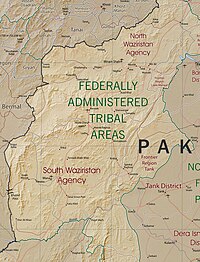Operation Rah-e-Nijat
| Operation Rah-e-Nijat | |||||||||
|---|---|---|---|---|---|---|---|---|---|
| Part of the War in North-West Pakistan | |||||||||
 Map of North and South Waziristan |
|||||||||
|
|||||||||
| Belligerents | |||||||||
|
|
|||||||||
| Commanders and leaders | |||||||||
|
|
|
||||||||
| Units involved | |||||||||
|
XI Corps Special Operations Command (Army SS Group, Air SS Group, Navy SS Group) 50th Airborne Division No. 27th Squadron Zarrars No. 25th Squadron Night Strike Eagles No. 11th Squadron Arrows |
Unknown | ||||||||
| Strength | |||||||||
|
28,000 – 45,000 troops 500 SSG Commandos |
10,000 militants 1,500 foreign fighters |
||||||||
| Casualties and losses | |||||||||
| approximately 200 killed, approximately 600 wounded (ground offensive) | 619 killed, 83 captured (ground offensive) | ||||||||
| 2 million civilians displaced | |||||||||
28,000 – 45,000 troops
10,000 militants
The Operation Rah-e-Nijat (English: Path to Salvation; Urdu: آپریشن راہ نجات) was a strategic offensive military operation by the unified command of Pakistan Armed Forces against the Tehrik-i-Taliban (TTP) and their extremist allies in the South Waziristan area of the Federally Administered Tribal Areas that began on June 19, 2009; a major ground-naval-air offensive was subsequently launched on October 17. It became the integral part of the war in Western fronts which led the encirclement and destruction of Taliban forces in the region, although the Taliban leadership escaped to lawless areas of neighboring Afghanistan.
The operation was aimed to finish the senior Taliban leadership and bring the lawless areas back to government control, however the leadership escaped to Afghanistan whilst areas came back under the Pakistan government control. Planning for the Operation became on June 16, 2009 after successfully commencing previous offense, the operation Rah-e-Ra'ast, and had applied a successful blockade of the region that prevented the Taliban forces to gain external support. On October 2, 2009, the preparation for such operation were made after a top civic-military meeting took place in the Islamabad which led the revival and starting of Navy's reconnaissance and surveillance air operations to monitor the troop rotations of Taliban forces. On October 19, the ground offense was launched when military personnel from XI Corps, along with the airborne forces who were assisted by the joint special forces, entered in the three-month-long blockade area of South Waziristan. The PAF pounded the hidden and suspected mountainous regions, relying on Navy's intelligence, while the Army marched deeper into Taliban-controlled territory. The joint-military forces entered and advanced in the region from three directions—Razmak in the north, Jandola in the east and Shakai in the west. The forces furthered advanced in the habitat towns of Makeen, Spinkai, Raghzai and Tiarz; initially focusing on taking the town of Kotkai which served as the command and control center for enemy combatant forces. On 24 October, The breakthrough and major achievement came to notice when the military announced the successful retake and the control of the town of Kotkai after a heavy fighting.
...
Wikipedia
